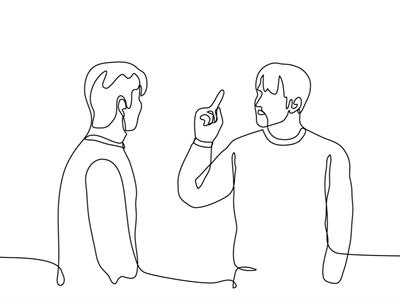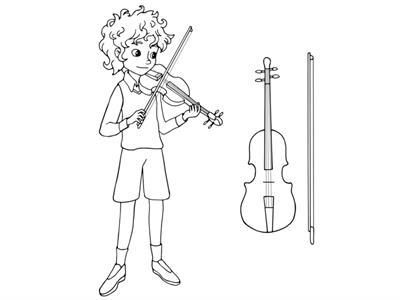
PUMPA - SMART LEARNING
எங்கள் ஆசிரியர்களுடன் 1-ஆன்-1 ஆலோசனை நேரத்தைப் பெறுங்கள். டாப்பர் ஆவதற்கு நாங்கள் பயிற்சி அளிப்போம்
Book Free Demo3. A headmaster once told his father that what Einstein chose as a profession wouldn’t matter, because “he’ll never make a success at anything.” Einstein began learning to play the violin at the age of six, because his mother wanted him to; he later became a gifted amateur violinist, maintaining this skill throughout his life.
4. But Albert Einstein was not a bad pupil. He went to high school in Munich, where Einstein’s family had moved when he was 15 months old, and scored good marks in almost every subject. Einstein hated the school’s regimentation, and often clashed with his teachers. At the age of 15, Einstein felt so stifled there that he left the school for good.
5. The previous year, Albert’s parents had moved to Milan, and left their son with relatives. After prolonged discussion, Einstein got his wish to continue his education in German-speaking Switzerland, in a city which was more liberal than Munich.
Explanation:
Einstein's headmaster once told his father that Einstein would never be successful in whatever profession he chose. On the contrary to his master’s statement, Einstein excelled in playing the violin. Einstein began to play the violin at the age of six because his mother wanted him to do it. Despite being a scientist by profession, he maintained the skill throughout his life. Moreover, the headmaster’s statement is ironic because not just he became a “gifted amateur violinist” but also one of the greatest scientists of all time.

Headmaster speaking to Einstein's father
Albert Einstein was not a poor performer in academics. Albert attended high school in Munich, where his family had relocated when he was fifteen months old. His parents had shifted from Ulm (the city in Baden-Wurttemberg) to Munich (the capital and most populous city of Bavaria, Germany). While he was studying in high school, he scored good marks in almost every subject.
Albert Einstein was not a poor performer in academics. Albert attended high school in Munich, where his family had relocated when he was fifteen months old. His parents had shifted from Ulm (the city in Baden-Wurttemberg) to Munich (the capital and most populous city of Bavaria, Germany). While he was studying in high school, he scored good marks in almost every subject.

A boy playing the violin
'Albert enjoyed elementary school since his teachers did their best to respond to all of his questions. They were friendly and patient' (*M. L., Pg. 18). But things got complicated when Einstein turned ten. The school in Munich (The Luitpold Gymnasium) was very strict, and he never liked it. Due to his dislike, he often clashed with his teacher's opinions and opposed them. The students wore uniforms and marched from one class to another like soldiers" (*M. L., Pg. 18). This had always made Albert extremely uncomfortable. He was dissatisfied with the subjects that his teachers were teaching him. His curious and quick mind had questions that no one could reasonably answer. However, the questions were not allowed at all. He was not even expected to think. Since that had never been Albert's style, he did not enjoy it at school.
Einstein struggled a lot in his high school because he could not cope with the strict discipline, so he left the school forever at the age of 15. When he left the school, he felt relieved and thought that it was his right decision. Before Einstein quit school, the previous year, his parents had moved to another city – Milan, which is in Italy. Albert was left behind in Munich with his relatives. After having a long discussion with his family and relatives, the boy's parents agreed to put him in a school in Switzerland. The school he studied in Switzerland was Cantonal high school. The language used there in the school for communication was German. Einstein also desired to continue his education in German-speaking Switzerland as the city was more liberal than the city of Munich.
'Albert enjoyed elementary school since his teachers did their best to respond to all of his questions. They were friendly and patient' (*M. L., Pg. 18). But things got complicated when Einstein turned ten. The school in Munich (The Luitpold Gymnasium) was very strict, and he never liked it. Due to his dislike, he often clashed with his teacher's opinions and opposed them. The students wore uniforms and marched from one class to another like soldiers" (*M. L., Pg. 18). This had always made Albert extremely uncomfortable. He was dissatisfied with the subjects that his teachers were teaching him. His curious and quick mind had questions that no one could reasonably answer. However, the questions were not allowed at all. He was not even expected to think. Since that had never been Albert's style, he did not enjoy it at school.
Einstein struggled a lot in his high school because he could not cope with the strict discipline, so he left the school forever at the age of 15. When he left the school, he felt relieved and thought that it was his right decision. Before Einstein quit school, the previous year, his parents had moved to another city – Milan, which is in Italy. Albert was left behind in Munich with his relatives. After having a long discussion with his family and relatives, the boy's parents agreed to put him in a school in Switzerland. The school he studied in Switzerland was Cantonal high school. The language used there in the school for communication was German. Einstein also desired to continue his education in German-speaking Switzerland as the city was more liberal than the city of Munich.
Meanings of the difficult words:
| S.No | Words | Meanings |
1 | Profession | Any type of work that needs special training or a particular skill, often one that is respected because it involves a high level of education |
2 | Amateur | Doing something for personal enjoyment rather than as a profession |
3 | Violinist | A person who plays the violin |
4 | Skill | The ability to do something well; expertise |
5 | Regimentation | Order or discipline is taken to an extreme |
6 | Stifle | Unable to breathe; suffocated |
Reference:
- National Council of Educational Research and Training (2006). Beehive. A Truly Beautiful Thing (pp. 46-53). Published at the Publication Division by the Secretary, National Council of Educational Research and Training, Sri Aurobindo Marg, New Delhi.
- *My Life Albert Einstein. New Delhi, General Press, 2018.